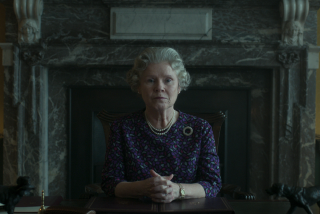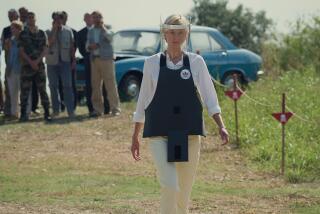Emily Blunt: A Queen, uncorseted
- Share via
The images conjured by Queen Victoria -- dour, dumpy and emblematic of a certain general uptightness -- do not immediately bring to mind the lithe and expressive actress Emily Blunt. Yet in “The Young Victoria,” directed by Jean-Marc Vallée from a script by Julian Fellowes and with producers including Martin Scorsese and Sarah Ferguson, the Duchess of York, Victoria is portrayed as a strong-willed young woman emerging into her own as queen from a cocooned upbringing pre-coronation. The film’s spunky attitude and steely spirit, with Blunt alternately slouching in her chair and skipping down a hallway, stakes out an unlikely middle ground somewhere between, say, “Whip It” and “Bright Star.” The 26-year-old, British-born Blunt first gained attention with her dangerous, sensual role in “My Summer of Love,” but she really came to wider audiences following her part as a ferocious fashion assistant in “The Devil Wears Prada.” Besides “The Young Victoria,” Blunt was also seen earlier this year alongside Amy Adams in the surprise indie hit “ Sunshine Cleaning,” and she is currently -- shooting “The Adjustment Bureau” opposite Matt Damon.
-- Mark Olsen I understand you lobbied hard for the part of the young Victoria.
I did slightly bully them once I was in the room. I’m usually a bit shoulder-shrugging about it, normally I wouldn’t make such a play for a part, they’re going to like you or they’re not. But I was aware that it was going to be one of those parts that many would desire to play, I could feel the wave of actresses behind me. So I thought I’d better pursue it aggressively and I tried to put aside my British reserve. And it worked.
What was it about this part that made it seem worth the effort?
I loved the script and how it approached her in a very un-reverential way. That was quite unique, and I could feel the youth sort of bouncing off the page. I’d had that perception of Victoria like most people, this kind of sad-faced old bag, and here was the antithesis of that in her younger years. She was a rebel and very forward-thinking. I very quickly fell in love with the character rather than the fact that she was the queen of England.
Had you ever been taught much about Victoria or her husband, Albert, in school?
Well, we have a whole lot of kings and queens, so there’s only the limited paragraph you’re told on each one. I didn’t study much history, but now I wish I had because it would have taken the pressure off the amount of reading I had to do when I got the part. To really discover it was her and Albert, and especially Albert, who brought about social reform and supported the arts and sciences, what he did for the poor, for architecture -- they created Victoriana, collectively. I’m from London and every corner has a Victoria pub or Albert inn, monuments, the Victoria and Albert Museum, they are literally on every corner of the city. And I started to suddenly really see that, to realize what that meant.
One of the things I found so appealing about the film was its attention to genuine palace intrigue, all the backstage wrangling over power and order of succession to the throne, what exactly the relationship between the monarchy and the government is, as well as the odd protocols such as how, for safety as a girl, she was never to walk down stairs without someone holding her hand.
That’s Julian Fellowes. He detailed that so accurately, her life under a microscope with all these political dealings going on behind her back. I realized it was a character who really can’t put a foot wrong, and what a performance it must be to be the queen of England, and then to be able to undo your corset behind closed doors. What a feat for that young girl to be that resilient, to know after that oppressive childhood, being a political pawn for all those years, to be disallowed friends, or to not walk down a staircase without someone holding her hand, it goes on and on. The resilience of her, that quiet, tenacious quality she had that she was going to be great, and she knew it, I loved how determined she was. At the end of the day she was just a strong girl who held on.
Once she did become queen and the media onslaught occurred, as it was in those days, she was ridiculed in the press, cartoons were drawn of her, there weren’t embarrassing pictures where she was filmed panty-less coming out of a taxi, but it was equally embarrassing, probably. But I think Albert was the one who became the figure of trust for her and a selfless love. I think with him by her side she felt completely invincible. I think it was a great relief for her when he showed up.
More to Read
Only good movies
Get the Indie Focus newsletter, Mark Olsen's weekly guide to the world of cinema.
You may occasionally receive promotional content from the Los Angeles Times.










